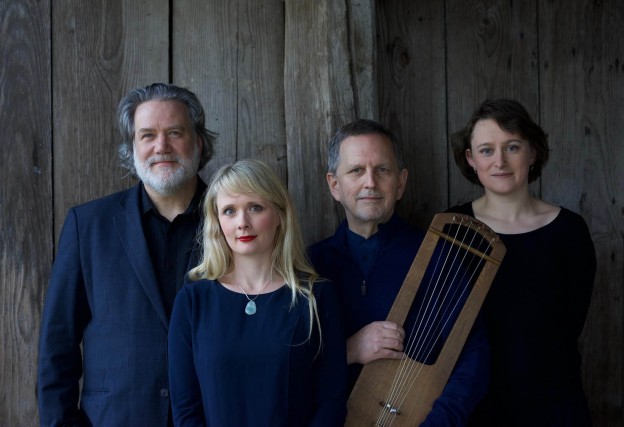On Friday, March 1, the renowned medieval music ensemble Sequentia will perform a series of Medieval Northlandic charms, riddles, and elegies at Swarthmore College. In this world-premiere performance, director, harpist, and vocalist Benjamin Bagby and his colleagues, vocalist and harpist Hanna Marti, vocalist Stef Conner, and flutist Norbert Rodenkirchen, will chant and sing these songs in Old English, Old High German, and Old Icelandic, displaying English Professor Craig Williamson’s original translations. Professor Williamson’s translations are taken from his recently published book The Complete Old English Poems, and these translations largely inspired Bagby to construct the musical lineup.
According to Professor Williamson, he and Bagby became interested in each others’ academic work on Beowulf about ten years ago. Since then, they’ve built a friendship centered on passion for medieval studies. After Professor Williamson published The Complete Old English Poems in 2017, Bagby was “overwhelmed” with its “beauty and its depth,” and, after corresponding with each other in the same year, Professor Williamson and Bagby planned this performance to showcase both Sequentia’s and Professor Williamson’s talents.
Among the pieces that Benjamin Bagby and Sequentia will perform are Old English riddles. Though Anglo-Saxon riddles are not set to music, what makes them special are their humor and sexual suggestiveness; they are the modern day equivalent of “dirty jokes”, except Old English Riddles have both a clean and “dirty” answer. In addition, the group will sing the Anglo-Saxon magic charm of Nine Herbs, a story of healing; the Old Icelandic Song of Grotti’s Milestone, the narrative of the rebellion of two slave girls against their king; Deor, the lamentation of a tribal singer rejected by his chieftain; the lament of the last survivor from Beowulf; and Wulf and Eadwacer, a mysterious lament of a woman cut off from her lover, and some of the oldest recorded songs from the German-speaking people.
Listening to Sequentia’s performance, even if one is familiar with medieval music, is still worthwhile because no two performances of the same Medieval song will ever be the same. We usually think of music based on a certain song’s melody. However, medieval songs are “based on beats,” explains Professor Williamson. “We don’t really know the tunes. Music was never really written down in any of the Anglo-Saxon and Old Germanic languages…we have to reconstruct the melody.” So, one singer might perform the same song in a completely different way than another performer. This is especially true of Benjamin Bagby who, according to Professor Williamson, takes a more “storytelling” and “acting” approach in his performances.
In fact, Professor James Blasina of the Music Program hopes that his students will be inspired by Benjamin Bagby and Sequentia’s unique performance and see “the strong links between academic study and musical performance.” Professor Blasina says that it is tempting sometimes to try to to separate “history and context” and “ what is often referred to as the ‘music itself,’” when, in reality, “there is no such thing as the ‘music itself,’ and in order to understand the music, you have to understand more than just the notes on the page.” Benjamin Bagby and Sequentia, Professor Blasina says, exemplify just that. “To have them here is pretty spectacular,” Professor Blasina says, and he along with the Music Program feels so fortunate to be able to hear them perform live and interact with them in the classrooms.
If one is not familiar with Medieval music, however, Professor Blasina says we can still “appreciate the beauty of [the music] and find it interesting” simply by “listening to the aesthetics of the sound.” He also suggests paying particular attention to the humor in the text as a way to relate to these songs that might seem out of reach for some. Professor Blasina says that in much Medieval music, there is a “very strong sense of reverence, but also a very strong sense of irreverence.” Though it may seem ironic and paradoxical, this opposition is essential in portraying the humor and Professor Blasina says “if we can find the humor in that music” and “find the same things funny…that is one way to connect to other human beings.”
Professor Williamson is also a firm believer that, even though the songs Sequentia will be performing are from centuries ago, “there are elements of [the music] that cross the bridge between cultures and between times and between genders.”
“They were human beings,” Professor Williamson says. “Maybe they lived a different kind of life than we lived, but they had lovers, they had children, they had sorrows, they had joys…there are many ways in which they are like us.” In listening to Benjamin Bagby and Sequentia’s performance, Professor Williamson hopes that the audience will be able to see “what’s shared and what’s human between two times and two people” and form a profound connection that “crosses the bridge across time.”
The event is sponsored by the Cooper Foundation and will take place on Friday, March 1, in the Lang Concert Hall at 8 p.m.
Maria Consuelo de Dios ’21
